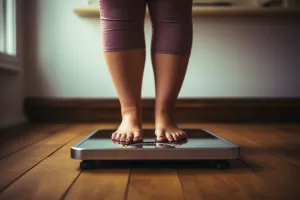Having a good sleep is essential for our well-being. It is only natural to opt for medicine that helps you sleep if you cannot properly rest. Some people prefer FDA-approved medications, some gravitate to a mild and natural approach and search for suitable supplements.
Unlike some other countries, melatonin is not considered a medication in the USA as it was not FDA-approved for any indication. Therefore, it is only available as a supplement.
There is a lot of misinformation online about melatonin pills and weight gain. We took a look at the scientific research to separate facts from myths, and this article is about our findings.
What is Melatonin
Melatonin is a hormone. This may, at least partially, create the opinion that melatonin causes weight gain. It is a natural compound produced by the pineal gland in the brain to help regulate our circadian rhythms.
In supplements, melatonin can be synthesized or produced from the pineal gland of animals. The synthetic option is better because it poses no risk of biological contaminants.
How melatonin works for sleep
Melatonin secretion is triggered by darkness. When the person is exposed to light, the release is decreased. Once released, melatonin interacts with various hormone receptors in the body, inducing the feeling of fatigue, sleepiness, lower body temperature, etc. This prepares the organism for a night’s rest.
Melatonin and Weight Gain
The connection between weight gain and melatonin is not really a well-researched topic. All available studies have been conducted either on animal models (mice) or have a small volunteer pool. However, the existing information suggests that melatonin does affect weight—but not in a way one would imagine.
Firstly, there is an established connection between insomnia and cortisol, the infamous stress hormone. It is not yet clear whether high cortisol levels cause insomnia or vice versa, but the connection certainly exists. And excessive cortisol is associated with increased fat accumulation. Therefore, when the person treats their insomnia with melatonin, they prevent cortisol-induced weight gain.
Secondly, melatonin affects leptin and ghrelin—hormones that are related to hunger and appetite. Leptin, produced by fat tissue, sends signals to the brain that the stomach is full and requires no more food for now. Ghrelin does the opposite, making you hungry.
There was research revealing that young people who were deprived of sleep and spent only 4 hours in bed, had disbalance in that hormone and were very hungry in the morning, craving foods high in refined carbohydrates, such as sweets or salty snacks. This shows how insomnia can lead to overeating and push you to junk food.
Another study, published in 2022 by Frontiers in Nutrition, “suggested a positive impact of exogenous melatonin on subjective appetite and plasma leptin”.
And, finally, a small study revealed that melatonin intake was able to prevent or reduce postmenopausal obesity in women.
As you can see, melatonin supplements and weight gain do have a connection with an exact mechanism yet to be studied. However, clinical evidence suggests that healthy sleep aid gained from melatonin can promote weight loss instead of obesity.
Melatonin Side Effects
Melatonin supplements are generally safe. The most common adverse reactions caused by them include:
- Daytime drowsiness;
- Dizziness;
- Stomach ache and nausea;
- Headache;
- Irritable mood;
- Skin and mouth dryness;
- Night sweats.
There is also a risk of individual hypersensitivity that is present with any product. As always, we encourage you to consult your primary healthcare specialist before starting any new medicine or supplement and seek medical help if you notice any negative effects on your well-being.
Melatonin is not recommended for pregnant people, patients with autoimmune conditions, liver or kidney injuries, or known allergic reactions to the compound.
Tips for Using Melatonin Wisely
The standard dose for melatonin is 3 mg. It requires 1–2 hours to work, so the person should take it 1–2 hours before their suggested bedtime.
Natural Alternatives to Melatonin
Natural remedies and micronutrients also can be helpful in developing a healthy sleep-wake routine. We remind you to address such products the same way as supplements: let your doctor know that you want to start them and consult them if you feel any undesirable side effects.
Valerian Root
Valerian root has a sedative effect on the body. This means its active compounds suppress certain neural signals and inhibit brain activity. This makes the person feel relaxed and sleepy.
Lavender
The lavender essential oil has a pleasant scent most often described as relaxing. If the smell makes you feel comfortable and relaxed, you can spray lavender mist on your bedsheets and pillow or just massage your temples with a drop of oil. Of course, you should not use this method if you had an allergic reaction to essential oils previously.
Magnesium
Magnesium deficiency can affect mental health, causing various disorders, such as anxiety or insomnia—therefore, one can address their sleep issues by properly replenishing mineral levels.
How to Treat Weight Gain
If you are not satisfied with what your weight scale tells you, take a quick review of your lifestyle. It has a huge impact on your well-being and health.
Healthy Eating
A wholesome, nutritious diet is your source of micro and macronutrients your body needs to function properly. Check your calorie intake to ensure that you are not overeating and review your eating habits to exclude junk, excessive sodium, and refined carbs. Your family doctor or experienced specialist in nutrition can guide you on that journey.
Physical Activity
Sports help you burn energy stored in fat tissues and build muscles to make your body strong and continue to burn calories. Moreover, it affects your health like a magical pill, reducing stress, balancing libido, improving cardiovascular health, helping you sleep better, etc.
Medication
An ongoing health condition can alter your weight and nullify your efforts to control it. If you suspect this is being an issue, talk to your doctor to develop a treatment plan and address the source of the problem.
Summary
Melatonin naturally presents in the body, regulating many processes, including sleep. Its supplements can be used to address jet lag and certain sleep disorders. There is no clinical evidence that supports the claim that will melatonin make you gain weight.
FAQ
Is it bad to take melatonin every night?
No, it usually takes a prolonged treatment course to develop a healthy sleep-wake pattern.
What are the bad side effects of melatonin?
Side effects and their severity can be individual but melatonin is generally safe. The most common reaction is daytime drowsiness, so it is not recommended for those who require sharp attention for their work.
Does melatonin make you bloated?
It may cause stomach aches and irritation; bloating, if present, is more an individual reaction than common.
What sleep medicine causes weight gain?
The most commonly used sleep prescription drugs and supplements do not cause weight gain, at least, directly.





